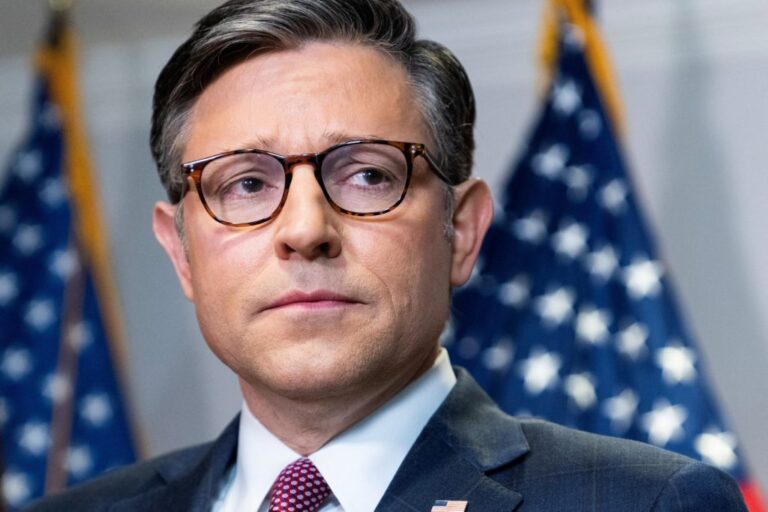House Speaker Mike Johnson, Republican of Louisiana, speaks to a news conference at the Republican National Committee after meeting with former President Donald Trump and the House Republican Conference in Washington, DC, June 13, 2024. Photo by Poole via Tom Williams/Reuters.
WASHINGTON (AP) — House Speaker Mike Johnson said Friday the House will go to court to enforce a subpoena against Attorney General Merrick Garland seeking access to audio interviews with President Joe Biden’s special counsel, hours after the Justice Department declined to pursue Republican contempt of Congress charges.
read more: Justice Department says Garland won’t be charged with contempt for refusing to provide Biden audio
“It is sad but expected that the Biden Administration’s Department of Justice will not indict Garland for failing to comply with a congressional subpoena, even as it vigorously prosecuted Steve Bannon and Peter Navarro for the same crimes,” Johnson said in a statement. “This is another example of the two-tiered justice system the Biden Administration has brought about.”
In a letter to Johnson early Friday, Justice Department officials noted the department’s “long-standing position and consistent practice” of not prosecuting officials who disobey subpoenas on the basis of presidential claims of executive privilege.
The Democratic president last month asserted executive privilege to block the release of the audio, but the White House has said Republicans only want it released for political purposes. Republicans moved forward with the contempt effort anyway, voting Wednesday to punish Garland for his refusal to provide the recordings.
Assistant Attorney General Carlos Felipe Uriarte noted that the Justice Department under presidents of both political parties has declined to prosecute similar situations where executive privilege was asserted.
Therefore, the Justice Department “will not present a contempt indictment to a grand jury or take any action to indict the Attorney General,” Uriarte wrote to Johnson, who did not say who within the Justice Department made the decision.
Republicans were furious that Special Counsel Robert Hur did not indict Biden over his handling of classified documents and instead immediately launched an investigation. Republican lawmakers, led by Representatives Jim Jordan and James Comer, sent subpoenas seeking audio of Hur’s interviews with Biden, but the Department of Justice only turned over portions of the records and did not provide audio of the interviews with the president.
Republicans have accused the White House of concealing the tapes because they fear the president will let voters listen to them in an election year. A spokesman for Mr. Jordan criticized the Justice Department’s actions on Friday, saying, “It’s the rule of law for you, but it’s not for me.”
A transcript of the interview with Hur shows that Biden struggled to remember some dates and occasionally mixed up details — something he has done for years, both publicly and privately, longtime aides say — but he otherwise has a good memory. Biden and his aides are especially sensitive to questions about his age. At 81, Biden is the oldest president in history and is seeking another four-year term.
The attorney general said the Justice Department went to extraordinary lengths to provide lawmakers with information about the Heo investigation, but Garland said releasing the audio could harm future sensitive investigations because witnesses would be less likely to cooperate if they knew their interviews might be made public.
White House counsel Ed Siskel, in a letter last month detailing Biden’s decision to assert executive privilege, accused Republicans of seeking the recordings in order to “chop up” and distort them to attack the president. Executive privilege gives the president the right to withhold information from courts, Congress and the public to protect the confidentiality of decision-making, but it can also be challenged in court.
The Justice Department also noted that it declined to prosecute Attorney General Bill Barr, who was indicted for contempt in 2019. The Democratic-controlled House of Representatives voted to issue a complaint against Barr after he refused to turn over documents related to the special counsel’s investigation into former President Donald Trump.
The Justice Department similarly dismissed charges against Mark Meadows, Trump’s former chief of staff, after he was found in contempt of Congress for withdrawing cooperation with the Jan. 6 committee investigating the Capitol attack. A few years earlier, then-Attorney General Eric Holder was found in contempt in connection with a gun-smuggling operation known as “Operation Fast and Furious.” The Justice Department also took no action against Holder.
Two former White House officials, Peter Navarro and Steve Bannon, were charged with contempt of Congress for failing to comply with a subpoena from the committee on January 6. Both were found guilty at trial and sentenced to four months in prison. Navarro has been incarcerated since March, and Bannon has been ordered to turn himself in by July 1.
Hoare, the special counsel in charge of Biden’s case, spent a year investigating the president’s improper storage of classified documents while a senator and vice president and said there was insufficient evidence to successfully prosecute the case in court.
Hoare wrote that Biden’s limited memory and the president’s cooperation with investigators “may lead some jurors to believe he made innocent mistakes.” Her report also described the president as “someone about whom jurors would want to find reasonable doubt.”
left:
House Speaker Mike Johnson, Republican of Louisiana, speaks to a news conference at the Republican National Committee after meeting with former President Donald Trump and the House Republican Conference in Washington, DC, June 13, 2024. Photo by Poole via Tom Williams/Reuters.

